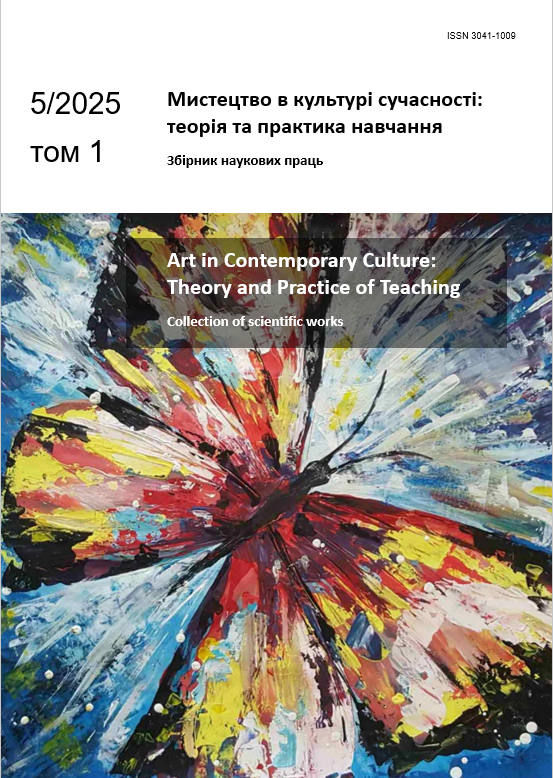METHODOLOGICAL PRINCIPLES OF FORMING THE INTERPRETATIVE CULTURE OF THE FUTURE MUSIC TEACHER IN THE PROCESS OF VOCAL EDUCATION
Published 2025-05-15
Keywords
- interpretive culture, musical performance, vocal training, performing skill, vocal training method, future teachers of musical art, professional training

This work is licensed under a Creative Commons Attribution 4.0 International License.
How to Cite
Abstract
The article examines and clarifies the issues of interpretation of musical works in the process of vocal training of future music teachers. The actual understanding of the concept of "interpretive culture" is presented. It is proven that from the point of view of interpretative culture, the highest motivational stimulus of vocal students is the desire for an artistic result from the produced original, individual and emotionally filled semantic type of intonation. Based on the generalization of scientific research on interpretation in the field of musical art, the specifics of working with future teachers in classes in the vocal class were analyzed. It was determined that the main direction of students' musical-cognitive activity in the process of vocal training should be the development of their artistic thinking, because this type of thinking is capable of ensuring the perception and study of musical phenomena in combination with artistic-content and lexical-grammatical aspects. They allow us to understand and appreciate the expressive possibilities of music as a whole and to form a complete picture of the singing culture of the nation whose works are being studied. During the methodological substantiation of our research, it was concluded that for a deeper analysis of the interpretation of the phenomenon "interpretive culture", it is necessary to take into account various scientific approaches that are the most effective for defining this concept. These were the hermeneutic, cultural, axiological, semiotic and national-style approaches. It is emphasized separately that for the formation of the interpretive culture of the future music teacher, it is advisable to use the methods and techniques that have historically developed in the practice of vocal training. Together, they contribute to the deepening of the artistic and interpretive skills of the future music teacher and to the enrichment of their professional competence.
Downloads
References
- Антонюк В. (2017) Вокальна педагогіка (сольний спів): підручник / НМАУ ім. П. І. Чайковського. 3-тє вид. К., 218 с.
- Василевська-Скупа Л. П. (2014) Формування комунікативної компетентності майбутніх учителів музичного мистецтва. Монографія, Вінниця, 225 с.
- Демір М. І. (2015) Педагогічні умови формування інтерпретаційної культури майбутніх учителів музики / Педагогічні науки: теорія, історія, інноваційні технології. № 9. С. 12-18
- Крицький В. (1998) Формування уміння художньої інтерпретації у студентів музичних факультетів педагогічних вузів. Наукові записки Ніжинського державного педагогічного інституту ім. М. В. Гоголя. С. 5 – 9.
- Москаленко В.(1994) Творческий аспект музыкальной интерпретации (к проблеме анализа)юК. : Изд-во Киев. гос. конс., 157 с.
- Падалка Г. М. (2008) Педагогіка мистецтва (Теорія і методика викладання мистецьких дисциплін) К.: 274 с.
- Пляченко Т. (2005)Методика викладання вокалу. Навчальний посібник. Кіровоградський державний педагогічний університет імені Володимира Винниченка, 79 с.
- Рудницька О. (1998) Основи викладання мистецьких дисциплін. К. АПН України, 183 с.
- Тоцька Л. (2007) Сучасні тенденції розвитку вокальної підготовки майбутніх учителів музики / Наук. часопис НПУ імені М.П. Драгоманова. Теорія і методика мистецької освіти: зб. наук. пр. К.: Вип. 5 (10). С. 75-78.
- Щолокова О. (2014). Теоретико-методичні засади культурологічної освіченості педагога-музиканта. Професійна мистецька освіта і художня культура: виклики ХХІ століття: мат-ли Міжнарод. наук.-практ. конф. (м. Київ) / МОН України, К. ун-т ім. Б. Грінченка. С. 96–104.





